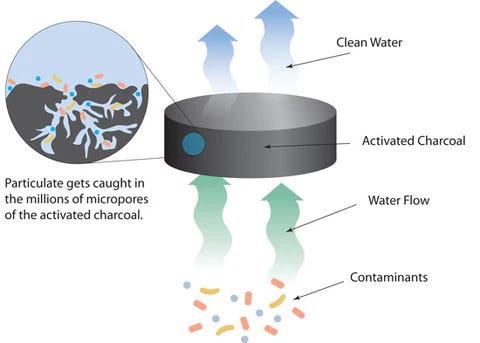This is part of an on-going series about forever chemicals that I have researched for almost a decade for my documentary, GENX. The full series is available on our substack.
When a company dumps poison into water, some people get hit harder.
There’s a reason why just buying water filters isn’t a real solution to pollution.
Sometimes it’s because they are closer to the source or because they are more at-risk, like an older person or a person undergoing chemotherapy. Other times, it’s because of a lack of resources. Water filters are a luxury, especially if you are poor. This problem compounds, because if you can’t afford to filter the toxic stuff out and then you get sick - health care is also a luxury. If it’s too expensive, you might wait longer before seeking care and at that points, it’s tougher to deal with. The same pollution can affect two peopel very differently. Fewer resources literally means fewer options.
If you have wealth, you can probably move away when your house is deemed a toxic dump site, but that’s not an option if your home is all you have. You could also hire a law firm to go after the polluters and that might be a real threat. But what if you don’t have the money to move or sue? Will the polluters get away with it? They will probably try.
Along this journey I met La’Meshia Whittington at a rally about standing up to corporations. LA was truly a courageous voice in the crowd as she spoke. Among her many roles, she serves as a professor, activist, and director for multiple organizations working on activism and social progress across North Carolina. We’ve pulled together some moments from her interview to expand on these concepts of environmental (in)justice.
So why aren’t water filters a good solution?
For one, they are a bandaid to the true problem - not having toxic stuff in water to begin with. But there’s a bigger issue, which is how they make your neighbors worse off. When someone installs a reverse osmosis filter, it removes essentially all pollutants including PFAS from their water. But what happens to all the bad junk?
It becomes more concentrated as it returns to the water cycle. This means anyone downstream has more bad junk in their water, so if they don’t have filters it’s literally worse. We see this problem at scale when affluent communities take a bandaid approach by filtering their entire community which means a superconcentration of pollution for everyone downstream.
That doesn’t mean filters are bad, but it does mean we need to weigh those downstream effects into the equation.
This is where equity really matters. More resources, means more responsibility.
Let’s build on the example of a wealthy community wanting to take action. Fighting the polluters with litigation or legislation is a more long-term approach that can benefit all neighbors, not just the wealthy folks.
Also some filters can make downstream water safer overall. Many municipal water providers use a complex series of filters including activated-carbon stages. These carbon filters serve as sponges that soak up pollution to permanently removed it from the water cycle until they are eventually used up (too full with stuff) and replaced.
As the communities across the globe move forward with radical plans to cleanup pollution, we have to keep in mind the disparities of impact. Poor and marginalized communities need and deserve more help. Tied up in wealthy inequality is social inequality that stems from historic oppression such as racism.
And ultimately, these issues are linked to the water cycle that literally connects all of us. We cannot help ourselves until we help our neighbors.
Stay hopeful,
Eli






